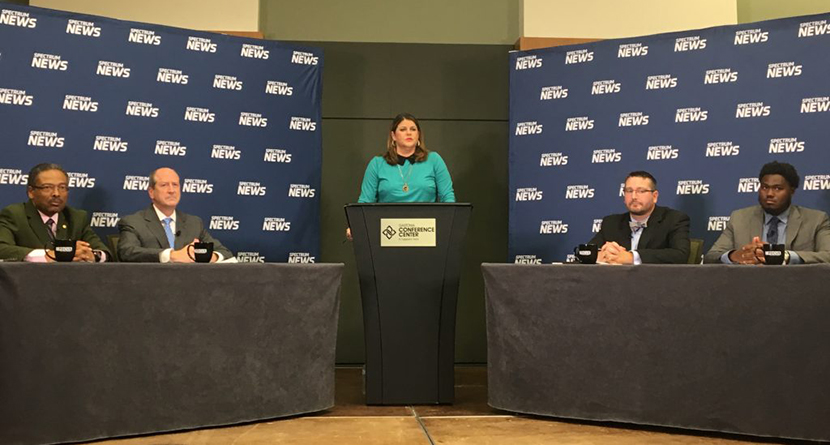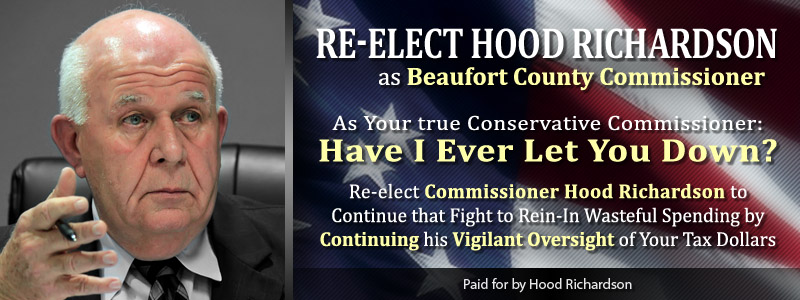Stewards of the Visual Exposition
Final Hometown Debate Focuses on Tax Cap Amendment
Publisher's note: This post appears here courtesy of the Carolina Journal, and written by Will Rierson, editorial intern.
Legislators and policy advocates debated Tuesday in Gastonia over a proposed constitutional amendment which would lower the cap on state income tax rates from 10 to 7 percent.
The personal income tax now sits at a flat rate of 5.499 percent. The amendment originated as a bill in the state Senate, and featured a 5.5 percent cap. Some House members balked, and the final measure passed the legislature with the rate capped at 7 percent.
Sen. Dan Bishop, R-Mecklenburg, and Americans for Prosperity state director Chris McCoy argued in favor of the amendment. Rep. Kelly Alexander, D-Mecklenburg, and N.C. Justice Center analyst Brian Kennedy argued against it. Spectrum News Senior Political Reporter Loretta Boniti moderated.
The tax cap amendment is one of six voters will consider for the Nov. 6 election. Early voting opened Wednesday.
Alexander said lowering the cap could limit the funding of public programs if the state experienced an economic downturn or disasters such as hurricanes.
"I'm from the 'if it ain't broke, you don't have to fix it' school," Alexander said. "Ten percent has worked for us. It gives us enough room should we need to go higher."
Alexander praised additions to the state's Rainy Day Fund made by Republicans, but said it would be depleted too quickly without a strong source of revenue.
Bishop said the 10 percent income tax cap, which the state has never reached, did nothing to control tax hikes in the 2000s.
"In great economic times, Democrats raised taxes," Bishop said. "As we entered the recession, Democrats raised taxes again. In other words, when things were good raise taxes, when things are bad raise taxes. The only answer [was] raise taxes."
Kennedy said preserving a graduated state income tax within the current cap would give the state money to invest in areas that voters value.
"That would allow us to do things like bring teacher pay to the national average, it would allow us to do things like address some of the inequalities that are systemic about our economic recovery," Kennedy said.
Bishop countered that keeping income tax rates low would cause economic growth, reducing inequality.

At the final Hometown Debate, Tuesday, October 16, in Gastonia, from left, Rep. Kelly Alexander, D-Mecklenburg; Sen. Dan Bishop, R-Mecklenburg; moderator Loretta Boniti of Spectrum News; Americans for Prosperity state director Chris McCoy; and N.C. Justice Center analyst Brian Kennedy. (CJ photo by Will Rierson)
McCoy said states with relatively low taxes, such as North Carolina, see high growth rates as people move where their income will be protected.
"You're looking at a broad tax base that's expanding whenever people have the lower tax," McCoy said. "They know exactly what they're getting into when they come into North Carolina, and that creates a level of consistency that a lot of people are looking for."
Alexander said the business community cares about more than tax rates when considering investments in North Carolina.
"It looks at some of the things tax dollars fund, like education," Alexander said. "If we drive revenue out of the system and are unable to provide those other things, the lowest tax rate in the world, a zero tax rate, still is not going to attract people looking for quality of life things in their business decisions."
Alexander stressed his view that lowering the tax cap would hurt government programs that can serve as economic drivers.
"I don't think that lowering the rate is going to have all of these magical, mystical things that are going to happen."
His statement began a series of quips between the legislators.
"With that I completely agree," Bishop said. "There is no magic. There is discipline, and discipline practiced over a period of time begins to look like magic."
Alexander said the tax cap amendment would destabilize state finances, but fiscal discipline was still possible with the current cap.
"Ever since the Great Depression, we've had a 10 percent cap. And all of the things I've heard my colleague talk about ... took place with certainty. So the debate really is, Are we going to change certainty from 10 percent to 7 percent?"
Bishop responded.
"He said the 10 percent has been there since the Great Depression, and I agree," Bishop said. "It's Great Depression mentality, and it doesn't do us any good."
Bishop described the tax cap amendment as a new proposal in the ongoing state practice of Republican-led fiscal discipline.
"Low tax policies and careful spending policies, at the end of the day, benefit every single North Carolinian," Bishop said. "And that, I think, is what the notion of a tax cap recognizes. Taxes are not the answer."
The debate was the fourth and final installment of the Hometown Debate Series, hosted in towns around the state by the N.C. Institute of Political Leadership. The series featured statewide political candidates in 2016 and education issues in 2017.
The debate was held at the Gastonia Conference Center in downtown Gastonia. It will appear online in its entirety and air in edited form on Spectrum News Sunday, October 21, at 11:30 a.m. and 8:30 p.m. on "In Focus with Loretta Boniti."
Previous debates centered on amendments to change the judicial vacancy replacement process, enact voter ID, and change the state's board of elections appointment process. The series was sponsored by North Carolina's Electric Cooperatives, the North Carolina Sheriff's Association, and the John William Pope Foundation.
Go Back
Legislators and policy advocates debated Tuesday in Gastonia over a proposed constitutional amendment which would lower the cap on state income tax rates from 10 to 7 percent.
The personal income tax now sits at a flat rate of 5.499 percent. The amendment originated as a bill in the state Senate, and featured a 5.5 percent cap. Some House members balked, and the final measure passed the legislature with the rate capped at 7 percent.
Sen. Dan Bishop, R-Mecklenburg, and Americans for Prosperity state director Chris McCoy argued in favor of the amendment. Rep. Kelly Alexander, D-Mecklenburg, and N.C. Justice Center analyst Brian Kennedy argued against it. Spectrum News Senior Political Reporter Loretta Boniti moderated.
The tax cap amendment is one of six voters will consider for the Nov. 6 election. Early voting opened Wednesday.
Alexander said lowering the cap could limit the funding of public programs if the state experienced an economic downturn or disasters such as hurricanes.
"I'm from the 'if it ain't broke, you don't have to fix it' school," Alexander said. "Ten percent has worked for us. It gives us enough room should we need to go higher."
Alexander praised additions to the state's Rainy Day Fund made by Republicans, but said it would be depleted too quickly without a strong source of revenue.
Bishop said the 10 percent income tax cap, which the state has never reached, did nothing to control tax hikes in the 2000s.
"In great economic times, Democrats raised taxes," Bishop said. "As we entered the recession, Democrats raised taxes again. In other words, when things were good raise taxes, when things are bad raise taxes. The only answer [was] raise taxes."
Kennedy said preserving a graduated state income tax within the current cap would give the state money to invest in areas that voters value.
"That would allow us to do things like bring teacher pay to the national average, it would allow us to do things like address some of the inequalities that are systemic about our economic recovery," Kennedy said.
Bishop countered that keeping income tax rates low would cause economic growth, reducing inequality.

At the final Hometown Debate, Tuesday, October 16, in Gastonia, from left, Rep. Kelly Alexander, D-Mecklenburg; Sen. Dan Bishop, R-Mecklenburg; moderator Loretta Boniti of Spectrum News; Americans for Prosperity state director Chris McCoy; and N.C. Justice Center analyst Brian Kennedy. (CJ photo by Will Rierson)
McCoy said states with relatively low taxes, such as North Carolina, see high growth rates as people move where their income will be protected.
"You're looking at a broad tax base that's expanding whenever people have the lower tax," McCoy said. "They know exactly what they're getting into when they come into North Carolina, and that creates a level of consistency that a lot of people are looking for."
Alexander said the business community cares about more than tax rates when considering investments in North Carolina.
"It looks at some of the things tax dollars fund, like education," Alexander said. "If we drive revenue out of the system and are unable to provide those other things, the lowest tax rate in the world, a zero tax rate, still is not going to attract people looking for quality of life things in their business decisions."
Alexander stressed his view that lowering the tax cap would hurt government programs that can serve as economic drivers.
"I don't think that lowering the rate is going to have all of these magical, mystical things that are going to happen."
His statement began a series of quips between the legislators.
"With that I completely agree," Bishop said. "There is no magic. There is discipline, and discipline practiced over a period of time begins to look like magic."
Alexander said the tax cap amendment would destabilize state finances, but fiscal discipline was still possible with the current cap.
"Ever since the Great Depression, we've had a 10 percent cap. And all of the things I've heard my colleague talk about ... took place with certainty. So the debate really is, Are we going to change certainty from 10 percent to 7 percent?"
Bishop responded.
"He said the 10 percent has been there since the Great Depression, and I agree," Bishop said. "It's Great Depression mentality, and it doesn't do us any good."
Bishop described the tax cap amendment as a new proposal in the ongoing state practice of Republican-led fiscal discipline.
"Low tax policies and careful spending policies, at the end of the day, benefit every single North Carolinian," Bishop said. "And that, I think, is what the notion of a tax cap recognizes. Taxes are not the answer."
The debate was the fourth and final installment of the Hometown Debate Series, hosted in towns around the state by the N.C. Institute of Political Leadership. The series featured statewide political candidates in 2016 and education issues in 2017.
The debate was held at the Gastonia Conference Center in downtown Gastonia. It will appear online in its entirety and air in edited form on Spectrum News Sunday, October 21, at 11:30 a.m. and 8:30 p.m. on "In Focus with Loretta Boniti."
Previous debates centered on amendments to change the judicial vacancy replacement process, enact voter ID, and change the state's board of elections appointment process. The series was sponsored by North Carolina's Electric Cooperatives, the North Carolina Sheriff's Association, and the John William Pope Foundation.
| Suggestions to Strengthen Libel Laws are Suggestions to Suppress Free Speech | Carolina Journal, Editorials, Op-Ed & Politics | Itís Not ALL About Trump |





















